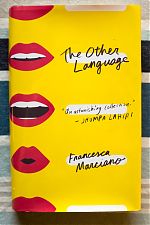
Francesca Marciano
The Other Language
Last year at John Cabot University here in Rome I heard Francesca Marciano read her story “The Italian System.” The story’s wit and charm and the voice of Marciano as she read made me want the book it was collected in, The Other Language, right away. But that was last summer and The Other Language wasn’t published until spring of this year. Instead I bought The End of Manners, which I liked though it has none of that subtle humor “The Italian System” has. At Almost Corner Bookshop in Trastevere a month ago I saw The Other Language’s yellow cover, went home and read some reviews and the next week when I went back to Trastevere I bought it, extra pleased with it for Marciano’s signature on the title page.
I dug in to the pages right away, starting with “The Italian System.” This story I like especially because it is like the American’s love affair with Italy, but is told the other way around. A young Roman woman moves to New York City and after some years starts to miss Italy. Her nostalgia for her home country almost matches the picture of Italy that foreigners have, except for her intimate knowledge of it. But the story is also about leaving the place you’re from behind and moving to a new country, the insecurities and doubts and groundlessness such a move causes.
Like Mavis Gallant and Paul Bowles, Francesca Marciano’s characters are those caught in a place that is no place, between two countries and ways of thinking. They are stories of outsiders who have moved from where they were born to places they will probably never belong. “The Club” stands out to me as the strongest example of this. It is about a woman who has lived in Mombasa for most of her adult life, who no longer thinks of England as home, but who still lives between the society of the people who moved there and the people who are from there. They are stories of outsiders who have moved all over the globe, and reading one story after another is a way of grasping the world, its various landscapes, its similarities and what it’s like to be both a part of it and on the outside of it.
Nothing can be said about this book without mentioning that Marciano wrote it in a language other than her own. She is a native Italian writing in English. The story of how she came to write in English is a fascinating one (that I’m not going to recount, so go here) because from a writer’s perspective it brings up questions about what a writer’s relationship with her language means for her writing. The freedom that Marciano feels in writing in English instead of Italian (where she is already a successful screenwriter) makes me wonder about what we carry around in our mother-tongue.
· · · · · · · · · · · · · · · · · · · ·